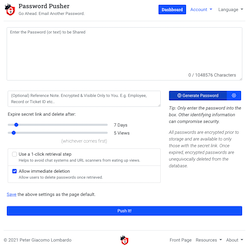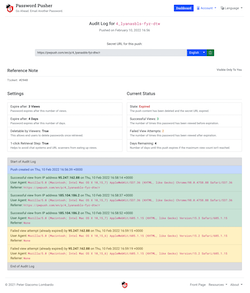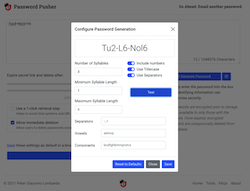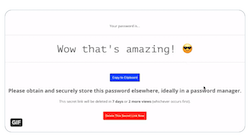Give your users the tools to be secure by default.
Password Pusher is an open source application to communicate sensitive information over the web. Secret links expire after a certain number of views and/or time has passed.
Hosted at pwpush.com but you can also easily run your own private instance with just a few steps.
- Easy-to-install: Host your own via Docker, a cloud service or just use pwpush.com
- Open Source: No blackbox code. Only trusted, tested and reviewed open source code.
- Versatile: Push passwords, text, files or URLs that auto-expire and self delete.
- Audit logging: Track and control what you've shared and see who has viewed it.
- Encrypted storage: All sensitive data is stored encrypted and deleted entirely once expired.
- Host your own: Database backed or ephemeral, easily run your own instance isolated from the world.
- JSON API: Raw JSON API available for 3rd party tools or command line via
curlorwget. - Command line interface: Automate your password distribution with CLI tools or custom scripts.
- Logins: Invite your colleagues and track what is pushed and who retrieved it.
- Admin Dashboard: Manage your self-hosted instance with a built in admin dashboard.
- Internationalized: 29 language translations are bundled in. Easily selectable via UI or URL
- Themes: 26 themes bundled in courtesy of Bootswatch. Select with a simple environment variable.
- Unbranded delivery page: No logos, superfluous text or unrelated links to confuse end users.
- Customizable: Change text and default options via environment variables.
- Light & dark themes: Via CSS @media integration, the default site theme follows your local preferences.
- Re-Brandable: Customize the site name, tagline and logo to fit your environment.
- Custom CSS: Bundle in your own custom CSS to add your own design.
- > 10 Years Old: Password Pusher has securely delivered millions and millions of passwords in its 10 year history.
- Actively Maintained: I happily work for the good karma of the great IT/Security community.
- Honest Software: Open source written and maintained by me with the help of some great contributors. No organizations, corporations or evil agendas.
💌 --> Sign up for the newsletter to get updates on big releases, security issues, new features, integrations, tips and more.
Password Pusher is also on Twitter
⚡️ Quick Start
→ Go to pwpush.com and try it out.
or
→ Run your own instance with docker run -d -p "5100:5100" pglombardo/pwpush:latest or a production ready setup with a database & SSL/TLS.
or
→ Use one of the 3rd party tools that interface with Password Pusher.
Documentation
See the full Password Pusher documentation here.
📼 Credits
Translators
Thanks to our great translators!
| Name | Language | |
|---|---|---|
| Oyale | Catalan | |
| Finn Skaaning | Danish | |
| Mihail Tchetchelnitski | Finnish | |
| Thibaut | French | |
| Thomas Wölk | German | |
| Martin Otto | German | |
| Robin Jørgensen | Norwegian | |
| Łukasz | Polish | |
| Jair Henrique | Portuguese | |
| Fabrício Rodrigues | Portuguese | |
| Ivan Freitas | Portuguese | |
| Sara Faria | Portuguese | |
| Oyale | Spanish | |
| johan323 | Swedish | |
| Fredrik Arvas | Swedish | |
| Pedro Marques | European Portuguese |
Also thanks to translation.io for their great service in managing translations. It's also generously free for open source projects.
Containers
Thanks to:
- @fiskhest the Kubernetes installation instructions and manifests.
- @sfarosu for contributing the Docker, Kubernetes & OpenShift container support.
- sirux88 for cleaning up the Docker files and adding multistage builds.
Other
Thanks to:
- @iandunn for better password form security.
- Kasper 'kapöw' Grubbe for the JSON POST fix.
- JarvisAndPi for the favicon design
...and many more. See the Contributors page for more details.
🛡 License
This project is licensed under the terms of the Apache License 2.0 license. See LICENSE for more details.
📃 Citation
@misc{PasswordPusher,
author = {Peter Giacomo Lombardo},
title = {An application to securely communicate passwords over the web. Passwords automatically expire after a certain number of views and/or time has passed.},
year = {2024},
publisher = {GitHub},
journal = {GitHub repository},
howpublished = {\url{https://github.com/pglombardo/PasswordPusher}}
}















